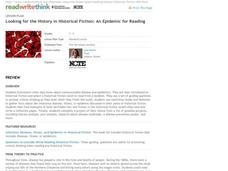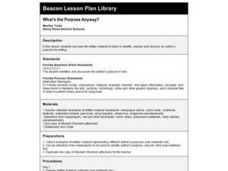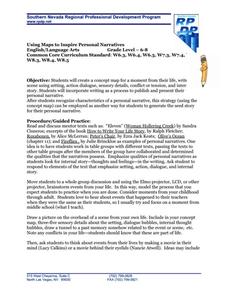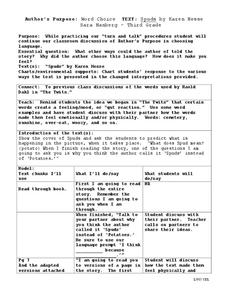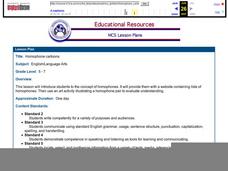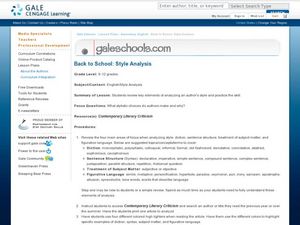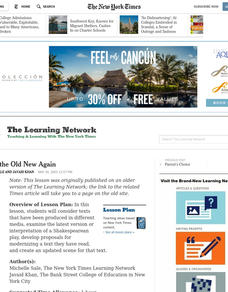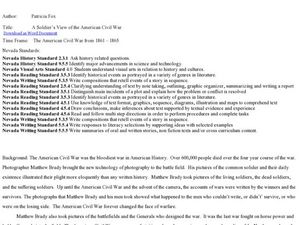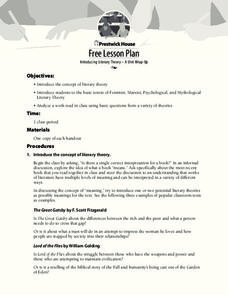ReadWriteThink
Looking for the History in Historical Fiction: An Epidemic for Reading
Combine informational reading skills with fictional text in an innovative historical fiction lessons. After reading a fictional text related to diseases, class members read non-fictional text to gain knowledge about specific infectious...
Curated OER
Paradise Lost: Bloom’s Taxonomy of Thinking Processes
Chapter II of John Milton's Paradise Lost provides the text for a series of comprehension questions crafted using Bloom's Taxonomy.
Curated OER
Reading Skills: Chunking
Prepare advanced English learners and low-level readers for the reading demands of post-secondary education with skill of chunking. Readers learn to make meaning from phrases rather than individual words, helping them to read more...
Curated OER
Author's Purpose
A simple activity for young readers, this introduces the idea of author purpose. Learners analyze various types of texts (newspaper articles, magazines, books, advertisements, etc.) and determine if the author's purpose for writing was...
Curated OER
Compare and Chart the Stories
Elementary schoolers engage in a literature study. They make comparisons of two different versions of a story using a graphic organizer. Using the text and pictures elementary schoolers investigate three elements from the story. Then,...
Curated OER
Teacher of the Year
Now is the time to identify the great teachers in your school! Discuss the characteristics of persuasive writing and analyze an example. Then, each pupil chooses a teacher who they feel should be named teacher of the year. They plan and...
Curated OER
Learning From World War II and Connecting It to the Present
Compare and contrast World War II to the modern Iraq war with this instructional activity. After watching a film, learners use supporting evidence to support their point of view of the conflicts. Using the internet, they create a...
Curated OER
What's the Purpose Anyway?
Examine author's purpose in newspaper articles, comic books, cookbooks, encyclopedias and other forms of written materials. Working in groups, middle and high schoolers read teacher-selected articles and write an explanation of the...
Southern Nevada Regional Professional Development Program
Using Maps to Inspire Personal Narratives
A solid description of one way to teach narrative writing, this resource outlines the writing process from concept to completion. Class members create concept maps of moments in their lives and follow the writing process to publish their...
Curated OER
Thinking Syntactically: Using non-print text to faciliate generation of syntax and analysis of tone
Students write with a command of the stylistic aspects of composition. They respond to non-print text. Students demonstrate working knowledge of syntactical choices. They construct sentences using descriptive language. Students analyze...
Curated OER
Making Real-Life Connections and Introducing Expository Text
Third graders write directions. For this real-life connections lesson, 3rd graders write the steps for making a peanut butter and jelly sandwich. After writing, students share their papers and actually make the sandwiches following the...
Curated OER
Word Purpose
Third graders chunk text while reading it. In this language arts lesson, 3rd graders determine the author's purpose for calling certain things the names they are called like spuds for potatoes. Students discuss how words affect the...
Pennsylvania Department of Education
Comparing Key Ideas and Details in Fiction and Nonfiction
Students recognize the differences between fiction and nonfiction texts. In this genre study instructional activity, students discuss what nonfiction means and write the definition. Students listen to a read aloud and vote whether the...
Curated OER
Energy
Scientific terms can be difficult to remember. This resource suggests developing analogies as a way to make energy terms memorable. After listing new terms on the board, groups develop analogies based on restaurant words, and then share...
PBS
Does Art Imitate Life?
Write what you know, sound advice for any writer and something many famous authors are known to have done. Use these materials to explore how Shakespeare's life influenced his plays. This resource is packed with readings, video segments,...
Curated OER
Shakespeare: Standing on the Bookshelves of Giant
A phenomenal lesson on Shakespeare! Middle and high school learners create WebQuests about the texts and authors that Shakespeare himself studied when he was in grammar school. They use a variety of media in order to create dramatic...
Curated OER
Homophone Cartoons
A terrific lesson plan on homophones awaits your youngsters. First, pupils access a website that contains lists of homophones. Then, it's time to get creative! Everyone gets a piece of poster board and they create a homophone cartoon -...
Curated OER
Ticker Text Parade
Students examine news headlines and create very brief news pieces in the style of news tickers. They write papers reflecting upon these experiences and on the value of concisely written news reports.
Curated OER
Following the Leaders
Examine the historic election of Pope Benedict XVI and reflect on the challenges he faces as the new leader of the Catholic Church. This New York Times lesson investigates how other world leaders are chosen in different forms of...
Curated OER
Back to School: Style Analysis
Jump back into expository writing and analysis at the start of a new school year! Start with a review of an authors' stylistic choices in diction, syntax, treatment of subject matter, and figurative language. Writers choose a text to...
Curated OER
Black Power
Use this New York Times lesson plan to research contemporary leaders in the African-American community. After reading the article "Blacks Weigh the Impact of the Post-Jackson Years," middle and high schoolers discuss the varying...
Curated OER
Making the Old New Again
How does a new version of a Shakespearean play change in the adaptation process? Use this New York Times' Learning Network lesson to consider texts that have been produced in different media. Middle schoolers examine the latest version...
Curated OER
A Soldier's View of the American Civil War
Study and research the American Civil War in this explanatory writing instructional activity. Middle schoolers complete six activities to learn about the American Civil War and soldiers' views of the war. The instructional activity...
Prestwick House
Introducing Literary Theory – A Unit Wrap-Up
Literary theories are lenses through which a text may be analyzed. The question in this lesson plan is how a particular literary lens can influence the reader's view of the text.


